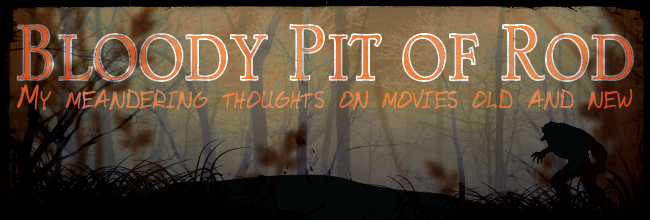Monday, February 23, 2026
Sunday, February 22, 2026
Thursday, February 19, 2026
The Bloody Pit #228 - Bits and Pieces
Wednesday, February 18, 2026
What I Watched in January 2026
I loved 28 YEARS LATER (2025) finding it to be a brilliant revitalization
of the film series. In fact, it felt like a story that almost needed a couple
of decades to feel relevant in our zombie saturated media world. If you leave
it up to scriptwriter Alex Garland to come up with a scenario and characters chances
are good that he will bring something of quality to the screen. Director Danny
Boyle seems to have enjoyed returning to this post-apocalyptic world and he
keeps the energy high while prolonging the mysteries at the core of the drama.
With THE BONE TEMPLE Boyle has turned things over to the
very talented Nia DaCosta who is slowly becoming someone I wish would just make
nothing but horror films. Her CANDYMAN sequel from a couple of years ago and
now this excellent series shifting entry show her as a surehanded director capable
of working very well in other creator’s playgrounds.
This film picks up right after the end of the previous movie
returning us to the tale of young Spike who learns to regret his decision to
live on the mainland since Britain remains long abandoned by the outside world with
the infected still roaming in packs. Quickly Spike is absorbed into the roaming violent group we saw in the final scene of the 2025 film and forced to
kill to survive. The group is under the leadership of a mad Satanist named Lord
Jimmy who sees the changed world as fodder for his Lord and Master’s cruel
vision of correcting humanity. The group views the infected as demons loosed
upon the world to inflicted punishment.
Meanwhile Dr. Kelson (a brilliant Ralph Fiennes) has found
that his morphine-based sedative allows him to calm the monstrous rage virus
infected ‘Samson’ to the point of establishing a relationship. This development
gives us a glimpse inside the creature’s mind and a possible path to a cure. But
when Jimmy’s group discovers Kelson among his human bone monument and speaking
to Samson they think they have found Old Nick himself.
28 YEARS LATER: THE BONE TEMPLE is as viscerally violent and dread inducing as fans of the series might expect but it is more emotional than even the 2025 movie. It expands the series’ universe in a thoughtful, unsettling way that has the potential to bring the entire story to an impressive end. If you are expecting relentless sprinting infected and nonstop carnage this may feel subdued. But for those interested in how horror evolves over time this film offers a chilling, contemplative chapter in a franchise that still understands how to disturb. With any luck we will get the promised third film in this tale so writer Garland can show us his conclusion.
The List
SPACE MONSTER WANGMAGWI (1967) – 5 (Korean kaiju silliness)
STAGE FRIGHT (1987) – 7 (rewatch on Blu)
QUENTIN DURWARD (1955) – 8 (widescreen period adventure)
WE BURY THE DEAD (2025) – 7
DOCTOR WHO & THE DALEKS (1965) – 7 (rewatch on 4K)
BEATRIZ (1976) – 7 (rewatch on Blu)
VENOMOUS (2001) – 4 (starts out well….)
VHS: HALLOWEEN (2025) – 5 (some good moments but too much doesn’t work)
PRIMATE (2025) – 7 (obvious but effective thriller)
THE MAD EXECUTIONER (1963) – 7 (excellent krimi)
MISS V FROM MOSCOW (1942) – 4 (WWII propaganda from RPC)
28 YEARS LATER: THE BONE TEMPLE (2026) – 9
THE ROAD TO SINGAPORE (1931) – 6 (well-made William Powell pre-code drama)
STATION-SIX SAHARA (1963) – 7 (tense drama with Carroll Baker)
SO YOUNG, SO LOVELY, SO VICIOUS… (1975) – 6 (sexy drama that gets more serious as it goes along)
SHADOW OF FEAR (1974) – 7 (solid TV mystery movie)
THE GIRLS OF THE GOLDEN SALOON (1975) – 2 (terrible Euro-western packed with nudity)
THE DEADLY GAME (1965) – 6 (anthology espionage film) (a.k.a The Secret Agent)
HEAT LIGHTNING (1934) – 7 (great little drama at a desert gas station)
KNIVES OF THE AVENGER (1965) – 8 (rewatch on Blu)
THE INVASION OF CAROL ENDERS (1974) – 6 (TV movie with a supernatural side)
































